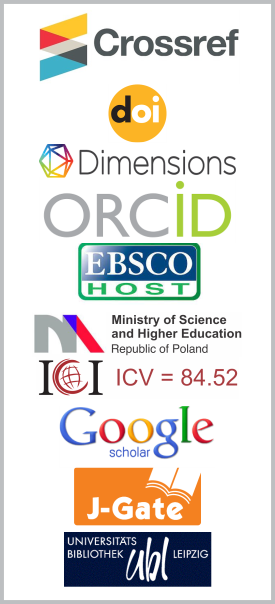Rural Library Staffs' Competencies in the Information Society
DOI:
https://doi.org/10.26713/jims.v9i4.983Keywords:
Rural library, Rural library staff, Information society, Human capacity, CompetenciesAbstract
The role of a rural library in developing an information society has long been realized by the government. The literature review indicates that the growth of the information society has forced the work environment and of librarians, especially in delivering services to the communities. Therefore, the rural libraries are being subjected to respond to the new changes. To ensure them to participate in the information society, there have to be appropriately trained workers in place; the rural librarian is required to put the element that promotes the use of information and rural library resources effectively. They should strengthen the function of a rural library staff as information intermediaries and increased their competencies to enable them to teachlibrary users to use the information they need for. The required competencies will be discussed in this paper.Downloads
References
M. Dutch and D. Muddiman, The Public library, social exclusion and the Information Society in the United Kingdom, Libri 51 (2001), 183 – 194, DOI: 10.1515/libr.2001.183.
S. Balina, Public libraries – facilitators of information society and e-inclusion in Latvia, Procedia - Social and Behavioral Sciences 109 (2014), 412 – 416, 10.1016/j.sbspro.2013.12.482.
N. Adetoro, A.B. Oyefuga and M.Y. Osunkoya, Capacity building for sustainable library and information services development in Nigeria, Journal of Research in National Development 8(1) (2010).
E. Broos, Developing a model for information society competencies required by managers in the information society, in Handbook of Research on Human Performance and Instructional Technology, H. Song and T. Kidd (eds.), 2010, 470 – 484, DOI: 10.4018/978-1-60566-782-9.ch028.
G. Chester and A. Neelameghan, Information professional: Knowledge and skills development for serving marginalized and rural communities, Webology 3(3) (2006).
P. Mamvoto Mukundi Mutasa, The library as a tool for development: the case of Zimbabwe, IFLA Council and General Conference 70 (2004), retrieved from http://www.ifla.org/IV/ifla70/papers/083e-Mamvoto_Mutasa.pdf.
V.F.D. Goodman, Rural library services: historical development and modern-day examples from West Africa, New Library World 109(11/12) (2008), 512 – 532, DOI: 10.1108/03074800810921331.
P. Ngulube, The role of rural libraries in promoting the people's right to information, in Library and Information of South Africa (LIASA) 2000 Conference, (n.d), Durban, SA.
V. Dent and L. Yannotta, A rural community library in Africa: a study of its use and users, Libri 55(1) (2005), 39 – 55, DOI: 10.1515/LIBR.2005.39.
P.J. Lor, International advocacy for information ethics: the role of IFLA, International Review of Information Ethics 7(9) (2007), 2 – 11.
H.A. Linstone and M. Turoff, Delphi Method: Techniques and Applications (1975), p. 640, DOI: 10.2307/1268751.
C. Hsu and B. Sandford, The Delphi technique: making sense of consensus, Practical Assessment, Research & Evaluation 12(10) (2007), 1 – 8, DOI: 10.1016/S0169-2070(99)00018-7.
M.I. Yousuf, Using experts' opinions through Delphi technique, Practical Assessment, Research & Evaluation 12(4) (2007), available online: http://pareonline.net/getvn.asp.
V. Dent, Rural community libraries in Africa: challenges and impacts, IGI Global (2014)
O. Acevedo and K. Bresnahan, Providing and promoting public library services to a culturally diverse New South Wales, Australasian Public Libraries and Information Services 18(2) (2005), 59 – 70.
B. Taylor, S. Kermode and K. Roberts, Research in Nursing and Health Care: Evidence for Practice, Thomson, Sydney (2007).
A.K. Sharma and S. Bhardwaj, Marketing and promotion of library services, in International Conference on Academic Libraries (2009), p. 2001.
American Library Association, and American Library Association, ALA's Core Competences of Librarianship (2009), p. 284.
S. Hawamdeh and S. Foo, Information professionals in the information age: Vital skills and competencies, in Proc. International Conference for Library and Information Science Educators in the Asia Pacific Region (2001) (ICLISE 2001), pp. 1 – 10.
Downloads
Published
How to Cite
Issue
Section
License
Authors who publish with this journal agree to the following terms:- Authors retain copyright and grant the journal right of first publication with the work simultaneously licensed under a CCAL that allows others to share the work with an acknowledgement of the work's authorship and initial publication in this journal.
- Authors are able to enter into separate, additional contractual arrangements for the non-exclusive distribution of the journal's published version of the work (e.g., post it to an institutional repository or publish it in a book), with an acknowledgement of its initial publication in this journal.
- Authors are permitted and encouraged to post their work online (e.g., in institutional repositories or on their website) prior to and during the submission process, as it can lead to productive exchanges, as well as earlier and greater citation of published work.




